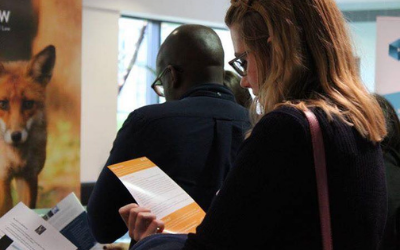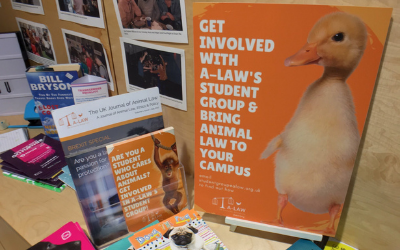By Dr. Meganne Natali
The CITES Conference of the Parties, this year called COP19, occurred in Panama City, from 14 to 25 November. The Conference of Parties meets every 2-3 years to review implementation of the Convention. This year, they discussed improving the implementation of Convention objectives and recommendations for listing certain species in the appendixes of the Convention.
CITES regulates trade in wild species through a system of annexes and permits. Appendix I of the convention includes species considered to be highly endangered. International trade for commercial purposes of these species is prohibited. Appendix II includes species whose commercial transactions would likely threaten their biological status. Appendix III corresponds to a voluntary approach by Parties wishing to list species for which they consider protection necessary and for which they consider that cooperation between States would serve their purpose better.
During COP19, many suggestions for the listing of species threatened by trade were proposed, including that of the jeypore Indian gecko, the horned lizards, and the musk turtles. In all, 600 species of animals and plants have been the subject of discussions and new regulations. In particular, sharks held a prominent place in the discussions. Decimated by intensive exploitation (and in part due to the use of their fins in soups), weakened by overfishing and the problem of bycatch, shark populations are in freefall all over the world.
The United Kingdom has been particularly in favour of the effective protection of sharks, supporting the listing of no less than 54 species of requiem sharks in Appendix II of the Convention. These efforts were ultimately rewarded with a ground-breaking decision that allowed 60 species of sharks to be listed on the Appendix II. (In fact, a Private Members Bill to ban shark fin imports is currently progressing through Parliament.)
In addition, Defra has pledged to contribute £4m to the International Consortium on Combating Wildlife Crime (ICCWC), strengthening the effectiveness of the combating illegal wildlife trafficking and supporting the efforts of State Parties to CITES.
This contribution seems greatly needed: not only is illegal wildlife trafficking not decreasing (and presenting a multi-sector threat), but also CITES suffers from the absence of a specific fund to finance its projects.
By allocating £4m, the UK is sending a strong signal in many ways. At the national level, this generous donation demonstrates that the country is aware of the need to fight against illegal wildlife trafficking; furthermore, it suggests that violations of its domestic regulations in this area will tend to be more sanctioned. At the international level, the donation affirms leadership in the fight against illegal wildlife trafficking led by the international community, which should inspire State Parties to CITES to align themselves and strengthen the financial and operational capacities they deploy to achieve the objectives of the agreement.
Footnotes:
1 Article II, paragraph 1 of the CITES.
2 Article II paragraph 2 a and b) of the CITES.
3 Article II, paragraph 3 of the CITES.
4 Nineteenth meeting of the Conference of the Parties, Panama City, Panama, 14 – 25 November 2022, Proposals for amendment of the Appendices, <https://cites.org/sites/default/files/notifications/E-Notif-2022-066.pdf>.
5 ALBERTS E. C., “New protections for sharks, songbirds, frogs and more at CITES trade summit”, 25 November 2022, <https://news.mongabay.com/2022/11/new-protections-for-sharks-songbirds-frogs-and-more-at-cites-trade-summit/>.
6 “The most recent global IUCN Red List of Threatened Species assessment of sharks estimated that over one third of species (37%, range 32.6–45.5%) are threatened with extinction”, IUCN.org, <https://www.iucn.org/story/202209/new-hope-conservation-sharks-rays-and-chimaeras-important-shark-and-ray-areas-isras#:~:text=The%20most%20recent%20global%20IUCN,et%20al.%2C%202021)>.
7 “WWF calls for urgency in implementation of decisions”, wwf.panda.org, 25 November 2022,
<https://wwf.panda.org/es/?7078441/A-landmark-moment-for-sharks-and-rays-as-doors-close-on-CITES-CoP19>.
8 Towards a World Free of Wildlife Crime – ICCWC launches Vision 2030, “ICCWC is a unique partnership between five intergovernmental organizations to strengthen criminal justice systems and provide coordinated support at national, regional and international level to combat wildlife and forest crime. It brings together Interpol, The UN Office on Drugs and Crime, The World Bank Group, The World Customs Organization and the CITES Secretariat”, 20 November 2022, <https://cites.org/eng/news/towards-a-world-free-of-wildlife-crime-iccwc-launches-vision-2030>.
About the author:

Meganne NATALI qualified as an Attorney in France and is also a Doctor of Law whose subject’s research focused on “International Law facing Illegal Biodiversity Trade”.
Deeply passionate about environmental protection, biodiversity preservation and animal rights, she writes articles and collaborates with organizations such as UK Centre for Animal Law.
She is also a Case Manager at the Doctoral Clinic of International Law and Human Rights of Aix, France, where she manages groups of students who work on concrete cases brought to them by clients such as NGOs or lawyers.







